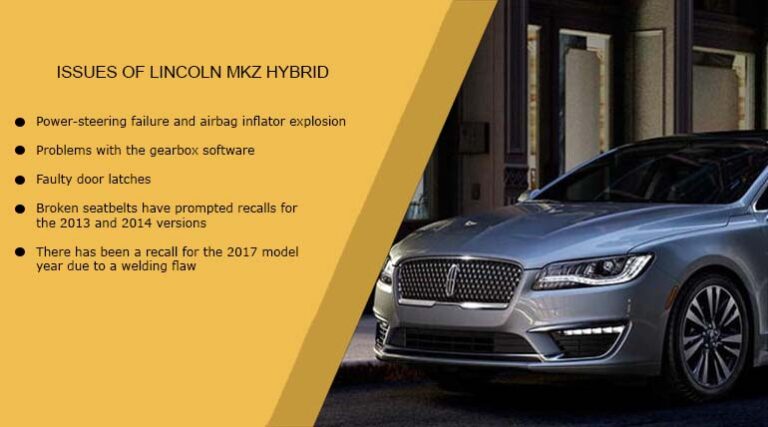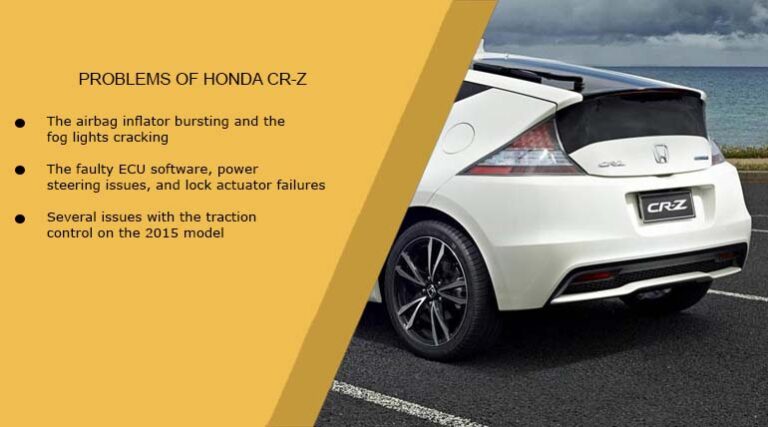Unveiling 10 Frequent Problems of Toyota Highlander Hybrid
The Toyota Highlander Hybrid is popular among consumers because of its low fuel consumption, roomy cabin, and dependable performance. It has flaws, but that’s expected with any car. This post will cover ten frequent problems of Toyota Highlander Hybrid. Although not every car will have these issues, anybody considering a Highlander Hybrid should know them.
Overview
To summarize, the Toyota Highlander Hybrid often has electrical issues that manifest as non-functioning equipment or warning lights. The vehicle’s speed control system, anti-lock braking system (ABS) actuators and power brake assist have all failed, making braking hazardous. Last, a malfunctioning ECU (2006 to 2010) or fuel pump (2017 to 2019) might cause the engine to stall.
10 Frequent Problems of Toyota Highlander Hybrid
The Toyota Highlander Hybrid has a solid reputation for dependability, but there are a few issues that have been raised by certain drivers that you should be aware of. These problems may be mitigated via consistent engine maintenance, rapid repairs, and discussing concerns with a licensed technician. For even more security, or buying a pre-owned Highlander Hybrid that has passed extensive inspection.
Below mentioned are the ten frequent problems of Toyota Highlander Hybrid that you must know;
1. Inverter Failure
Inverter failure is a frequent complaint from Highlander Hybrid drivers. The hybrid battery’s direct current (DC) must be transformed into alternating current (AC) via the inverter to power the electric motors. However, power outages and costly repairs are possible if anything goes wrong.
2. Brake Actuator Issues:
The brake actuator has been known to fail, leaving some drivers with a mushy or unresponsive brake pedal. The safety of the car is at risk. Thus this problem has to be fixed right away by a trained mechanic.
3. Hybrid System Failure
Problems with the hybrid system, resulting in diminished power and performance, have been noted by many owners. Because of the hybrid system’s complexity and the number of parts involved, fixing it may be an involved and time-consuming process.
4. Battery Life
Some Highlander Hybrid owners have reported their batteries failing prematurely due to the short lifetime of the hybrid battery. When shopping for a pre-owned Highlander Hybrid, it’s wise to factor in the expense of a new battery.
5. Transmission Problems
A tiny percentage of Highlander Hybrid customers have complained of gearbox issues. Rough shifting, hesitancy, and even total transmission failure are symptoms. When a car’s warranty expires, the repair cost might skyrocket. It often leads t strange noises such as grinding, scraping or squealing noises.
6. Oil Leaks
Oil leaks have been observed by several Highlander Hybrid drivers, most notably at the front timing cover. Inattention to these leaks might lead to costly engine damage if they aren’t fixed quickly.
Related article: Types of Gasoline Toyota Highlander Takes
7. Navigation System Malfunctions
The GPS system is a frequent source of trouble for Highlander Hybrid drivers. Incorrect instructions, frozen displays, and non-functioning systems are all possible issues. However, such issues can be fixed with a software update.
8. Electrical Problems
The Highlander Hybrid has had electrical issues for a few of its owners. Problems with electronic components such as windows, locks, and the instrument cluster are common. Troubleshooting and repairing electrical issues may be an expensive and time-consuming hassle. Such electrical malfunctions are also present in other hybrid vehicles such as Honda Civic Hybrid.
9. HVAC System Failure
The HVAC-system is the cradle to complaints from a small number of property owners. Problems might vary from poor air circulation to a total breakdown of the system. It may be overpriced to mend or substitute HVAC parts.
10. Premature Tire Wear
Some Highlander Hybrid drivers have griped about rapid tire deterioration. Alignment and suspension problems, which may lead to uneven tire wear, must be fixed if you value your safety on the road.
Toyota Highlander Hybrid’s Worst Year
After reading this, you may be debating between several Toyota Highlander Hybrid model years. To begin, it’s important to note that our study shows the Highlander Hybrid to be an excellent and trustworthy vehicle that can last you between 250,000 and 290,000.
Nonetheless, there are some Highlander Hybrid models or model years that we would recommend and others that we would not.
Highlander Hybrids model years 2006 to 2011 are the poorest of the bunch. Hence, the most common difficulties with these vehicles are electrical malfunctions, unexpected acceleration, and stalled engines.
Toyota Highlander Hybrid’s Best Year
The 2016 model year is the greatest time to buy a Highlander Hybrid. The lack of electrical difficulties, concerns with fast acceleration, and engine stalling make these vehicles the least complained about. Furthermore, hands-free calls in these vehicles do not experience any echoing.
Other Generations (Latest Ones)
All three years of the Highlander Hybrid’s production (2010-2012, 2015, and 2017-2021) are good bets. However, each has its own quirks. Of course, there are fewer problems recorded with the newest generation (2017 – 2021), but this is in part because they haven’t been on the road long enough to be properly evaluated.
Conclusion
To conclude, the Toyota Highlander Hybrid has a solid reputation for dependability. Still, several issues are reported by certain drivers that you should be aware of. However, these problems may be alleviated to some degree via routine maintenance, rapid repairs, and discussing any concerns with a licensed technician. For even more security, think about getting an lengthy warranty or buying a pre-owned Highlander Hybrid that has passed extensive inspection.







